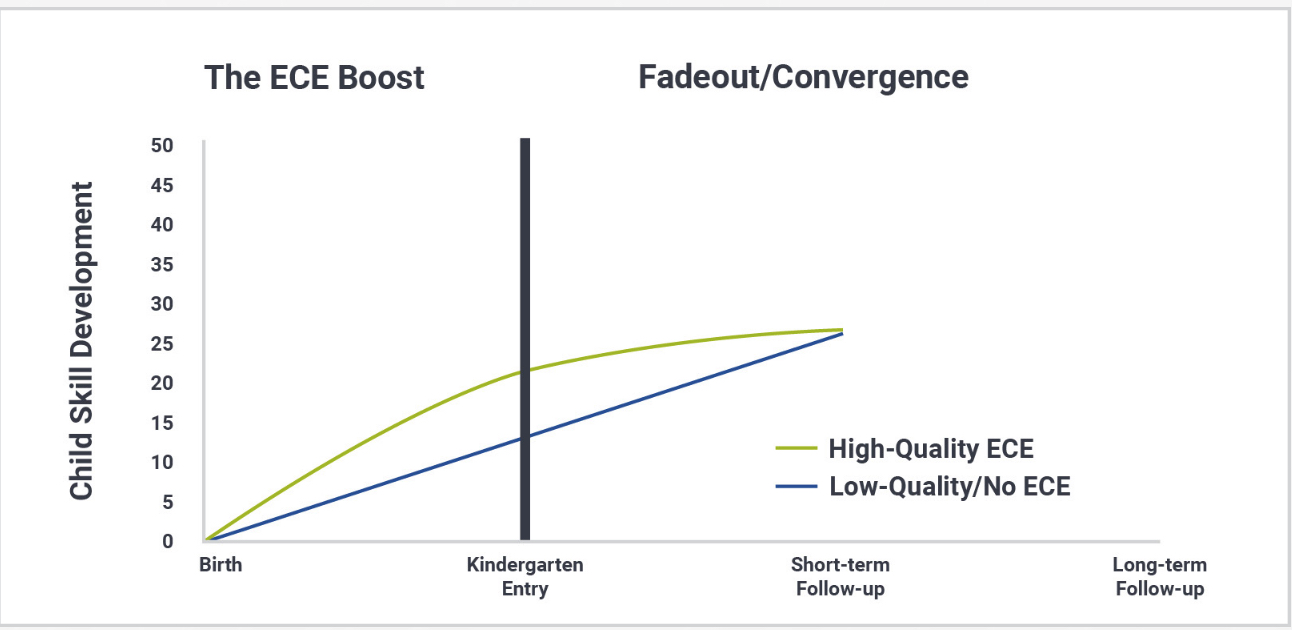Because we can’t take our Early Learning Nation Studio on the road during this time, stay tuned as ELN recaps Top Takeaways from important conversations, town halls, webinars and virtual events from the Early Learning field. And visit our Early Learning Nation channel on YouTube for interviews with leaders from education, child development, business, politics and more.
Does preschool help children become more successful adults? In a recent piece in The Wall Street Journal, Dr. Alison Gopnik (coauthor of The Scientist in the Crib, among other books) writes, “Twenty-five years ago, I thought that there wouldn’t be a straightforward answer to this question—development is just too complicated and hard to study. I was completely wrong.” (Read Bryce Covert’s analysis of the study that convinced Gopnik that preschool matters.)
Nevertheless, researchers continue to explore how to sustain the benefits that early childhood education (ECE) generates. In Robert C. Carr’s paper, “The Benefits of Early Childhood Education Can Persist in the Long Run” (jointly published in September by the Hunt Institute and the Sanford School of Public Policy at Duke University) the key word is can. Ample evidence points to the boost children get by starting their education early, but a review of the research reveals “mixed long-term impacts.” A lot depends on subsequent teaching and the environment in which it happens.
To explore these issues, Dr. Dan Wuori of the Hunt Institute moderated an Early Efforts conversation among:
- Dr. Craig Ramey, Virginia Tech
- Dr. Alison Gopnik, the University of California at Berkeley
- Dr. Francis Pearman, Stanford University
- Dr. Robert Carr, Duke University
Here are our takeaways:
1. Early childhood is the brain’s R&D phase. Gopnik described young children as amazing learners. “They explore,” she said. “They consider possibilities. They go out into the world and consider what it is like much more than grown-ups do.” Nurturing adults can make the most of this phase by stimulating imagination, creativity and possibility; adversity shortens it.
Just because the years are a period of rapid learning, Gopnik said, some educators assume pre-K should be more like “school,” but she maintained that social and emotional support is just as important as academic skills.
2. The Abecedarian project continues to yield benefits. Ramey described the Carolina Abecedarian Project as a randomized control trial that measures the impact of providing full-time, high-quality educational intervention from infancy through age 5. The landmark study continues to shape the field of early education.
Last year, filmmaker Carlota Nelson captured its influence in her documentary Brain Matters. “If anything,” Dr. Ramey said during the webinar, “we’ve underestimated lifespan long-term effects.” These include functional magnetic resonance imaging (fMRI) scans of adult brains that show structural changes in the regions for abstract thinking and language acquisition as well as benefits that accrue to the children of the adults who participated decades earlier.
Watch the Brain Matters trailer:
👉 Read: Brain Matters Documentary Attracts Global Interest
3. We know what produces the greatest results. The original Abecedarian Project, which inspired so much replication, lasted an entire school day and involved highly qualified staff.
Dr. Ramey and colleagues studied a replication implemented all across Louisiana and found increased fourth grade academic performance and decreased special education rates, among other effects. “The children at the greatest risk derive the greatest benefits,” he stated, “whether you measure that at the level of family resources or at the level of neighborhoods.”
4. High-quality kindergarten is necessary to sustain the advances of preschool. When policymakers discuss early learning, they frequently frame the benefits in terms of kindergarten readiness, but the lasting benefits also matter, and these only develop when quality teaching and school environments remain in place.
“While high-quality ECE programs can promote foundational skills and dispositions for learning,” Dr. Carr’s paper explains, “children’s acquisition of foundational skills will naturally plateau after they have mastered those skills.”

Therefore, the impact of high-quality ECE on foundational skills diminishes during elementary school (see graph, right). When done right, kindergarten enhances the preschool effect. Dr. Pearman’s complementary research conducted in Tennessee describes “Sustaining Environments”—involving both highly effective teachers and high-quality schools—and finds that only about 9 percent of children got what they needed in kindergarten, and without it, the pre-K boost faded by third grade.
5. The consequences go beyond education. Gopnik provided further context to the conversation, noting that what happens outside school also affects children’s fates. Policy supports for parents have a symbiotic relationship with education, contributing to “a sense of alternatives and things you can do beyond your narrow experiences.”
Dr. Ramey, who began his Abecedarian research in 1972, when he was 26 years old, declared, “This effort is not for the fainthearted or the ill-prepared,” adding that “the future of democracy and our capitalistic competitive economy” were at stake. It’s a life’s mission worth fighting for.

Mark Swartz
Mark Swartz writes about efforts to improve early care and education as well as developments in the U.S. care economy. He lives in Maryland.



